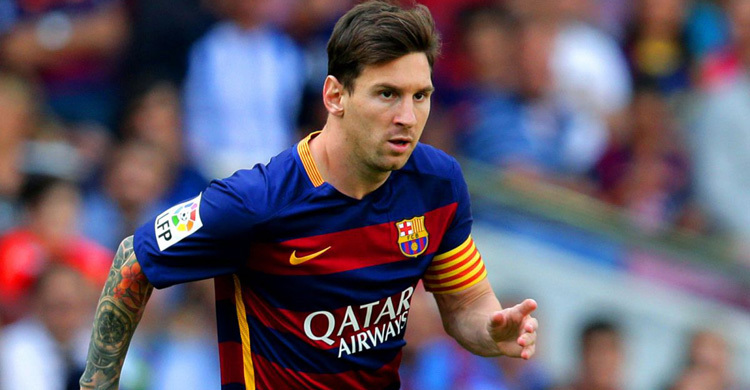Barca’s Messi support is irresponsible

How can a Spanish club dominate the headlines on the eve of the European Championship final? Here’s how: by launching a cringe-worthy, questionable social media campaign in support of Lionel Messi, who was found guilty of tax fraud last week.
Barcelona’s #WeAreAllLeoMessi social media campaign prompted mockery and condemnation in equal measure for encouraging fans to show their support for the club’s talisman in the wake of being found guilty of defrauding the Spanish state of €4.1 million and being handed a suspended sentence of 21 months in jail.
The club was instantly mocked on social media and attracted more serious criticism, too. The union representing workers at the Spanish tax authority pointed out that ‘claiming solidarity with someone who has committed tax fraud does not exactly improve the fiscal conscience of the Spanish people.’ Meanwhile Miguel Cardenal, the Spanish sports minister, condemned the club for meddling in the judicial process.
As it is commonplace for criticism of the club to be dismissed as ‘attacks coming from Madrid,’ it must be said the campaign was also condemned in Catalonia. Joan Maria Pou, from prominent Catalan radio station RAC1, tweeted: ‘No, no, no. We are not all Leo Messi. He’s the best footballer around but should we be rallying around him after fiscal fraud? Do yourselves a favour.’ An editorial in Catalan outlet Ara opined that ‘Barcelona have got this one wrong, and it will end up turning against them and Messi.’
The campaign was enthusiastically backed by many Barcelona supporters in and outside Catalonia, however, as it echoed a widely held belief that there is a conspiracy against Barca, one that`s motivated by the envy of the club`s success. This feeling comes from the very top of the club`s hierarchy, beginning with club president Josep Maria Bartomeu, who tweeted the day after Messi`s sentence: ‘Leo, those who attack you are attacking Barca and its history. We`ll defend you to the end.’
This view is also shared by the two biggest-selling sports newspapers in Catalonia.
‘The prison sentence, as well as being disproportionate, is completely partisan, designed with the objective of destroying Messi and destroying Barca,’ wrote a journalist in Sport.
And while a leading writer in El Mundo Deportivo claimed, ‘I personally wouldn’t have initiated a campaign like this,’ the words were buried in a long piece arguing that Messi had been only been sentenced because he is the symbol of a Barcelona side that have won six league titles in the past eight years.
This opinion is even shared by former Barcelona captain Xavi Hernandez, usually renowned for being one of the game`s great thinkers. Speaking about the court cases against Messi and against the club for their handling of the Neymar transfer, Xavi said: ‘I’ve realised that when things are going well [for Barca] they always stick a spanner in the works. I don’t mean to say that the court has made the wrong decision, but it comes right at the time when Barca are doing well. And that surprises me because there was a time when we didn`t win anything for four years and nothing like this came up.’
This blind support and a constant search for excuses do not do the club’s image any favours. It is no wonder the club`s motto of ‘Mes que un club’ is now so widely mocked by rival fans.
Anyone who follows the media in Spain will know how partisan it is, cleaved along Barca and Madrid lines, and that the press in the Spanish capital love to engage in bashing their rivals. Just take the chastising of Gerard Pique for simply declaring his dislike for Real Madrid and speaking out in favour of a referendum on Catalan independence.
But bringing club biases into matters of the law is ill-advised; so too is painting a player who committed fraud as a victim of state oppression. Rather than denouncing legal action against the club as some Madrid-led conspiracy, the club needs to take a long, hard look at why four of its players have faced court proceedings in the past three years for fiscal fraud. It could also begin some reflection about its own attitude toward taxation, with the club admitting to two counts of defrauding the Spanish tax agency just this week.
Backing a player who has committed a fiscal crime in a time when Spain is still reeling from a debt crisis is not only crass, it is irresponsible. Earlier this month, the Spanish tax agency revealed that it is owed €15.8 billion in unpaid tax revenue. Clearly, as has been stated widely, Messi is not the only one in Spain to have failed to fulfil his tax responsibilities at some point, but that does not mean he should not face consequences for his actions.
But leaving aside for a moment the moral question, Barcelona have also failed in their main objective in starting the social media campaign, which was to show their support for Messi.
Inferences from people close to Messi suggest he is not impressed by the campaign, which has only put the case under further scrutiny. Most of all, it has likely reminded the Argentine superstar of past instances when he did not have the club’s full support, including when proceedings against him began in 2013.
The club made no statement of support to Messi back then. And they failed to provide real support for Messi when he appeared in court in Barcelona last month; the only representative who joined the Messi family in court that day being player liaison Pepe Costa, one of Messi’s closest friends.
No one from the club’s board thought to show up in person, not Bartomeu nor vice-president Jordi Cardoner. Rather than an embarrassing social media campaign, that would have been the right show of support.


